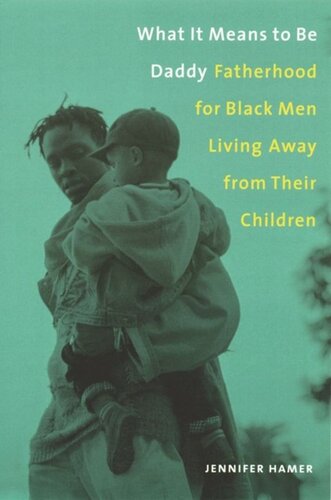

Most ebook files are in PDF format, so you can easily read them using various software such as Foxit Reader or directly on the Google Chrome browser.
Some ebook files are released by publishers in other formats such as .awz, .mobi, .epub, .fb2, etc. You may need to install specific software to read these formats on mobile/PC, such as Calibre.
Please read the tutorial at this link: https://ebookbell.com/faq
We offer FREE conversion to the popular formats you request; however, this may take some time. Therefore, right after payment, please email us, and we will try to provide the service as quickly as possible.
For some exceptional file formats or broken links (if any), please refrain from opening any disputes. Instead, email us first, and we will try to assist within a maximum of 6 hours.
EbookBell Team

4.8
64 reviewsAbsent fathers and households headed by single mothers are frequently blamed for the poor quality of life of African-American children. This book challenges these assumptions, arguing that they are largely an unfair reflection of non-working class white American values. Hamer places the behaviors of black non-custodial fathers in their social, political, and economic contexts and describes these fatherless families from the perspectives of the families themselves.
Absent fathers, the breakdown of the nuclear family, and single-mother households are often blamed for the poor quality of life experienced by many African American children. Jennifer F. Hamer challenges both the imposition of an inappropriate value system and the resulting ineffectual social policies. Most of what we know about fathers who do not live with their children is based on interviews with the mothers; this book is based on interviews with the fathers themselves. How do these fathers perceive their roles and responsibilities?
This myth-shattering book challenges stereotypes of negotiating parenthood within the context of poverty, live-away status, and black American manhood. Hamer has collected the voices of eighty-eight men who participated in this study by first examining the macro or cultural elements that encompass men's daily lives. As part 1 explores these larger forces that define the social world of fathers, part 2 looks at what significant others expect of men as fathers and how they behave under these circumstances. Part 3 analyzes the particular parenting roles and functions of fathers, using narratives of individual men to tell their own stories. In this book, contemporary black live-away fathers talk about their goals, walk us through their workplaces, allow us to meet their families and children, and enable us to view the world of parenthood through their eyes.